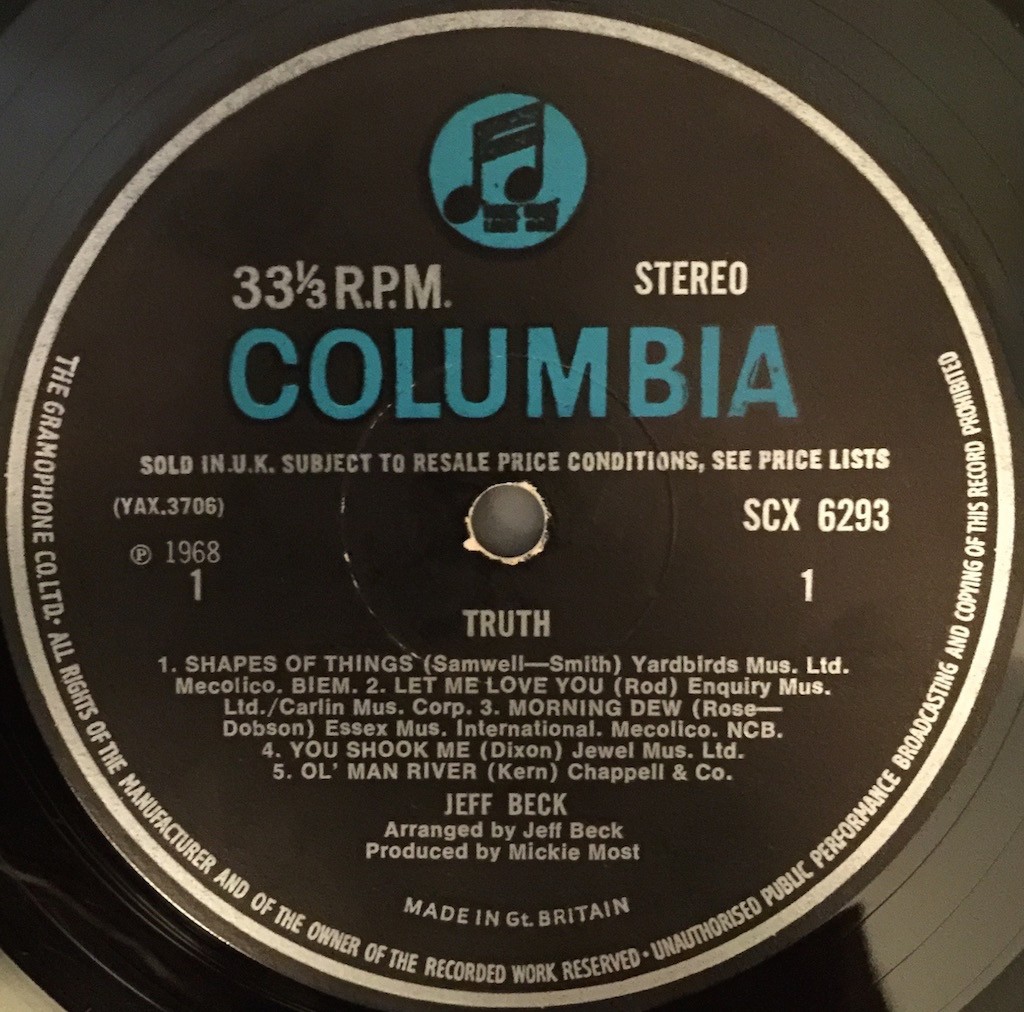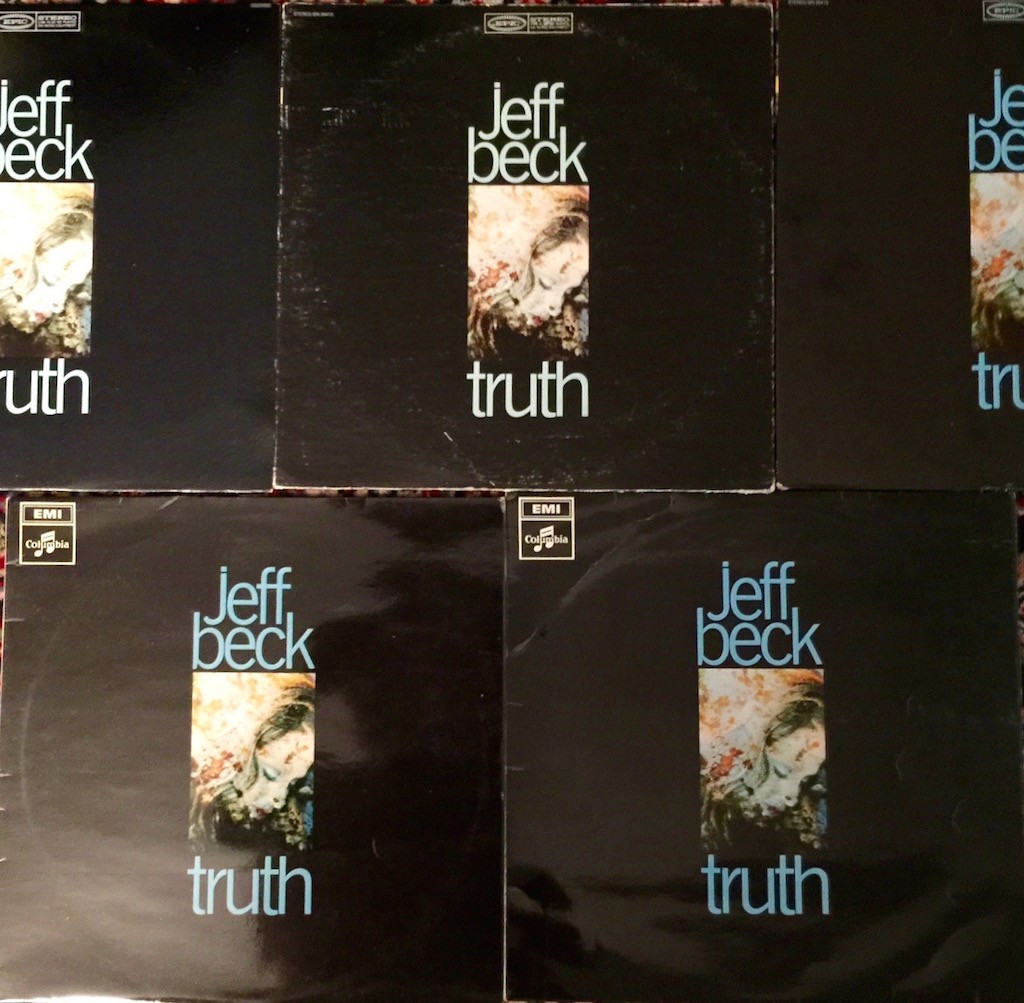
There’s a lot of controversy, if not fallacy about this, an album (somewhat ironically) entitled “Truth”: often credited as the first heavy metal album; the record that Jimmy Page allegedly used as a template for Led Zeppelin 1, released a short time later; a “who is the better guitarist/innovator” meme that continues to polarize today, almost five decades later. It seems that you cannot approach Jeff Beck’s Truth without veering into Led Zeppelin 1 territory.
For the record, I don’t regard either album as “heavy metal.” It’s blues, cranked up, distorted, and filtered through a hard rock/psychedelic lens. If these were the antecedents of heavy metal, you’d have to include Hendrix’s Are You Experienced, Blue Cheer’s “Summertime Blues” and much of The Cream.[1]
As for templates, I suspect that Beck and Page were working from a common palette- yes, both albums included “You Shook Me,” but both were drawing from the same well. I’m not trying to lay this eternal controversy to rest, but instead, to underscore the fact that Truth is rarely assessed on its own merits; it’s almost always discussed in comparison to the first Led Zeppelin album. One interesting take, in the period, is Al Kooper’s (a guy with considerable standing to make musical assessments). Kooper reviewed the Jeff Beck album for Rolling Stone in September, 1968, before the release of Led Zeppelin 1 and compares it to the work of The Yardbirds, The Cream and Hendrix. (Kooper also speaks to his disappointment in hearing the group live, and seems prescient about whether the band will endure). Whatever the truth about Truth, let’s take Led Zeppelin out of the equation and listen to it on its own merit.
“Shape of Things” is dramatically different than The Yardbirds’ version, which still has a “pop” quality; the Truth rendition brings the vocals front and center, and is not only slower but more dramatic in its changes; the guitar parts are stronger if not better played and more of a constant throughout the song. The song is also dirtier sounding and “heavier.”
“Let Me Love You” is classic psych/rock blues in the mold of Clapton’s work with Mayall and Rod’s voice is outstanding. The interplay between the vocal and guitar parts shows the strength of both singer and guitarist here. This is blues, but far more driving than the electrified stuff that inspired it. “Morning Dew” showcases Rod’s considerable vocal talent; as the song builds, it seems like it might lose direction, but manages to stay on track, despite the excursions of the “wah-wah” and the odd insertion of bagpipes.
“You Shook Me” is a “modern” interpretation, but not any less traditional in its style; the organ almost gets in the way but Nicky Hopkins’ piano playing on this track is outstanding. The guitar interlude starts as a distraction, but then gets on tone for a burst of distorted sustain to end it. It is a little ragged and rough around the edges, like a bunch of guys who know the song decided to record a jam session. “Ol’ Man River” is an odd choice, and one that doesn’t seem to belong; I’m not sure how well received it was at the time but despite the effort to turn it into something else, it still retains its show tune roots. I’m not sure this track has aged well.
Flip the side and “Greensleeves” is another oddity; I like Jeff Beck’s playing- he is technically a superb guitarist, but rather than lending strength to the album, it’s the sort of piece that might work better as a fragment, a segue between songs. “Rock My Plimsoul” works better, though you’ve already heard this before. Beck’s guitar work is stunning, and Rod works it well, but it is well-worn and cuts little new ground.
“Beck’s Bolero” is probably the most interesting track on the album, recorded some time before (and released as a single), and included an all-star cast of players, among them Mr. Page. The change from Ravel to the hard-rocking break is probably where the “heavy metal” meme comes from. “Blues Deluxe” shows off Nicky Hopkins’ keyboard chops, and gives Rod a chance to wail in best English- bluesman style. My personal favorite on this album is probably “I Ain’t Superstitious.” It captures the strength of this band at its best and takes the blues into distorted, psychedelic wanderings, replete with wah-wah and great drumming.
The record sounds different, depending on the pressing. For years, I stuck with an early yellow Epic pressing (U.S.) and relegated this to the “great record but mediocre recording” category; that didn’t stop me from playing it, but it sounded a little flat and lifeless.
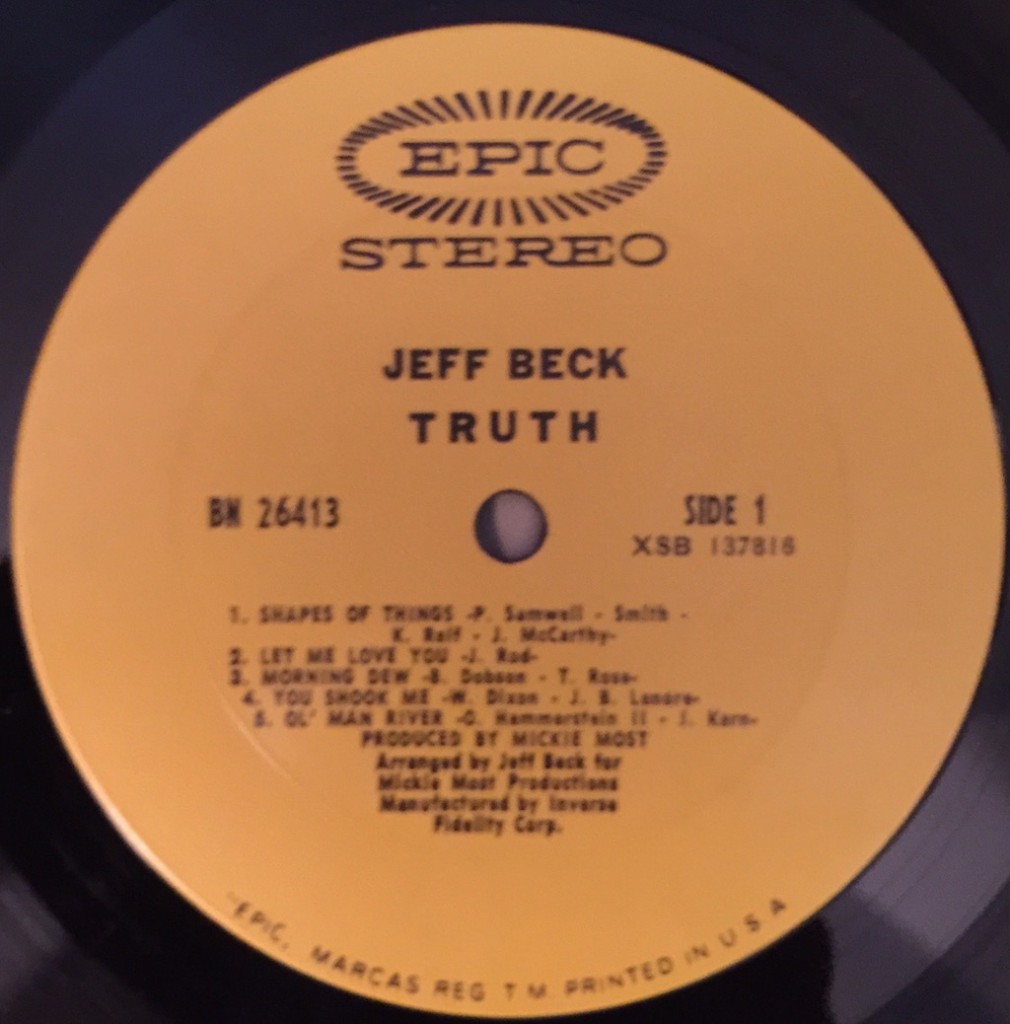 None of these copies (I have several) seemed to break through the barrier between the recording and my listening room. A friend gave me an early-ish UK copy on the Columbia-EMI label, which sounded much, much better. This was a second issue, as reflected by the black and silver label:
None of these copies (I have several) seemed to break through the barrier between the recording and my listening room. A friend gave me an early-ish UK copy on the Columbia-EMI label, which sounded much, much better. This was a second issue, as reflected by the black and silver label:
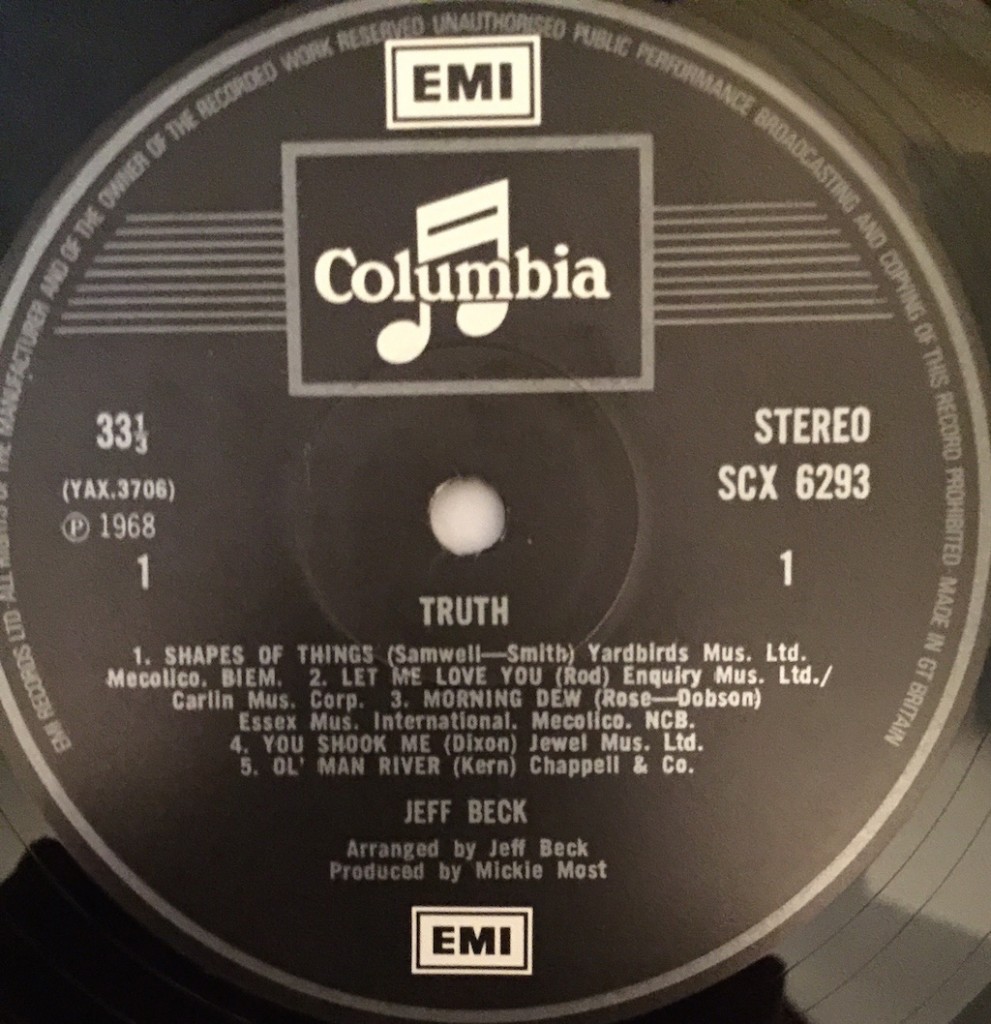
I finally broke down and bought a first UK press, with the blue on black typeface:
Outstanding! Compared to the yellow Epic copies, there was a dramatic increase in dimension, “air” and some real bass. If you are serious about this record you owe it to yourself to hear it on one of the early UK Columbia-EMI copies.
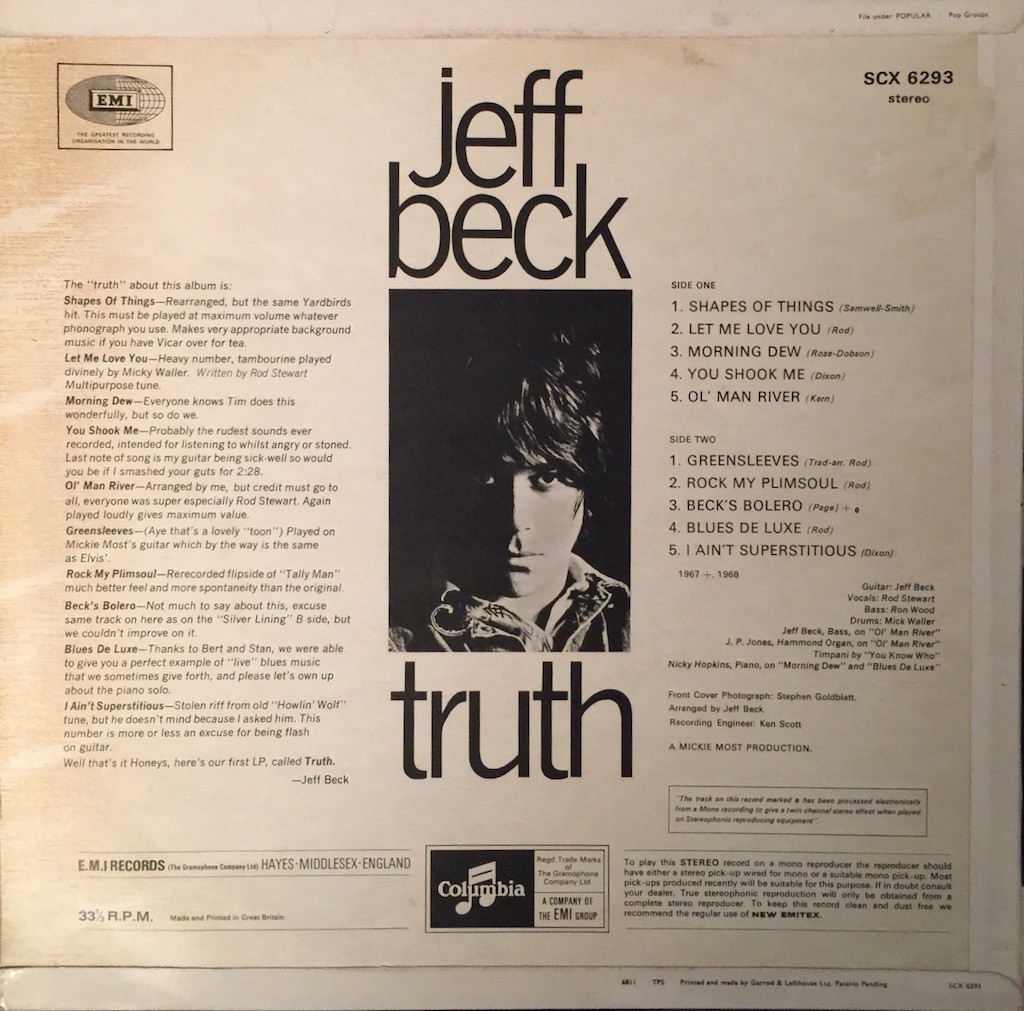
There’s also a mono version, quite collectible, but hard to find in minty condition. Sundazed reissued a mono version several years ago and for the modest cost of that, it is probably worth owning, just for the difference in some of the mixes.
Where I come out on this record, leaving comparisons to Zep I to the side: an innovative album, unpolished and a little disjointed: less of a “group” than a bunch of very talented musicians playing a one-off (which is pretty close to what happened- the follow up album was largely a disappointment). Jeff Beck shows his stuff here, and went on to a varied career as a first rate guitarist- perhaps one of the best, from a technical standpoint. But, that’s not all that makes music. To me, the real winner on this album, aside from Nicky Hopkins, is Rod Stewart.
Perhaps it was a template for many who followed, but it is uneven, in terms of both song selection and production values; in spite of those weaknesses, it still delivers a powerful experience. Truth is an essential record, probably best heard on one of the early UK pressings mentioned above.
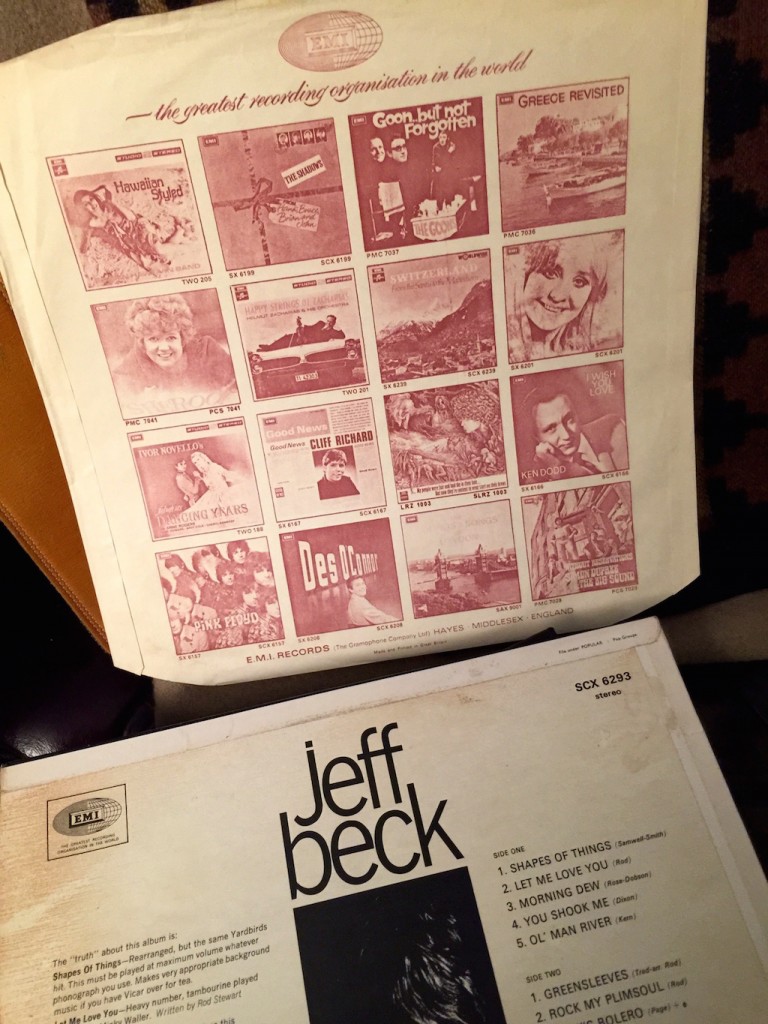
__________________________
[1] If you asked for my vote, it would probably be Black Sabbath, which is more thoroughly detached from blues antecedents, depended on power chords, the flatted fifth and the Goth imagery that became part of the iconography of the genre.
